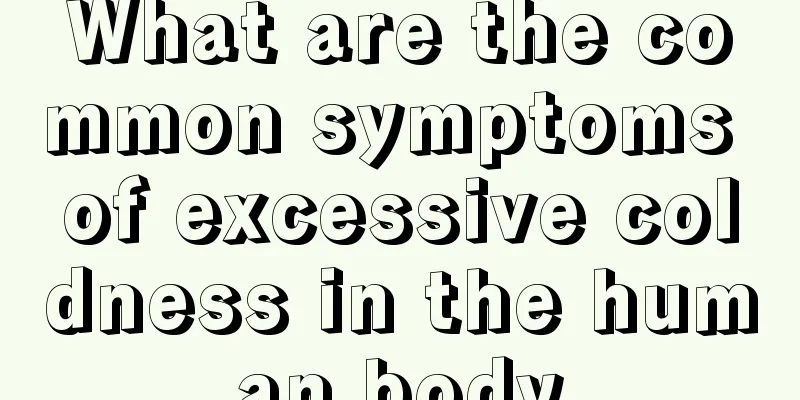Is it better to have a fast or slow heart rate?

|
Heart rate refers to the number of times the heart beats in one minute. Some people think that a fast heart rate is better, while others think that a slow heart rate is better. Therefore, many friends want to know the answer to the question of whether a fast or slow heart rate is better. So is it better to have a fast or slow heart rate? Next, this article will introduce you to the relevant content about whether a fast or slow heart rate is better, for your reference only. Friends who want to know more about this can take a look. There are significant individual differences in the heart rate of normal adults at rest, with an average of around 75 beats/minute (between 60 and 100 beats/minute). Heart rate can vary depending on age, gender, and other physiological conditions. Is it better to have a fast or slow heart rate? In fact, whether the heart rate is fast or slow, it is not good. 1. Fast heart rate (tachycardia) An adult's heart rate of more than 100 beats per minute is called tachycardia. There are two types of tachycardia: physiological and pathological. Physiological tachycardia is very common. Many factors affect the heart rate, such as changes in body position, physical activity, food digestion, emotional anxiety, pregnancy, excitement, fear, excitement, drinking, smoking, drinking tea, etc., all of which can increase the heart rate. Age is also a factor; children tend to have faster heart rates. Pathological tachycardia can be divided into two types: sinus tachycardia and paroxysmal supraventricular tachycardia. The characteristic is that the heart rate increases and decreases gradually. Generally, the heart rate does not exceed 140 beats per minute. Most patients have no organic heart disease. Patients generally have no obvious discomfort, but sometimes have symptoms such as palpitations and shortness of breath. If it is persistent tachycardia, it is necessary to find out the cause and treat it as soon as possible. 2. Slow heart rate (bradycardia) The normal heart rate is 60 to 100 beats per minute. A heart rate less than 60 is called bradycardia. There are several types of bradycardia, the most common of which is sinus bradycardia. Sinus bradycardia can be divided into pathological and physiological types. Physiological sinus bradycardia is a normal phenomenon. The general heart rate and pulse are between 50 and 60 beats per minute. Athletes may have a heart rate of 40 beats per minute. No treatment is required. It is common in normal people during sleep and in people who engage in more physical activities. A heart rate or pulse of less than 50 beats is mostly pathological and requires treatment. In severe cases, a pacemaker may be installed to speed up the heart rate. Bradycardia can be physiological or pathological. The physiological one does not require treatment and is a normal reaction. Pathological conditions require treatment, which is mainly due to insufficient blood supply to the heart, causing increased cardiac load. Therefore, the treatment should be a combination of oxygen therapy and drug therapy. The above is the relevant introduction on the question of whether a fast or slow heart rate is better. I believe that after reading the above introduction, you already have the answer in your mind. From the above introduction, we can know that both a fast heart rate and a slow heart rate are bad. If the heart rate is less than 60 beats/minute or greater than 100 beats/minute, it will have adverse effects on the body! Therefore, it is best to stay within the normal heart rate range. |
<<: What are the methods of making mixed mushroom soup
>>: What's the matter with the high hemoglobin in the physical examination
Recommend
Biejiarumo powder can be used to treat cancer pain in patients with cervical cancer
After cervical cancer occurs, patients usually ex...
Can color blindness be cured? Treatment for color blindness
Color blindness is quite common in life. Many peo...
Is the cure rate of ovarian cancer high?
The cure rate of early ovarian cancer mainly depe...
What is the reason for the flesh protruding from the anus during defecation
Many people may have experienced a fleshy protrus...
Skin cancer can cause systemic allergies
Improper treatment of any disease will cause a se...
What's the matter with the big stomach pain
The problem of stomach pain can be said to occur ...
Are identical twins hereditary?
Many people envy others for being able to give bi...
Dietary principles for patients with colorectal cancer
Diseases like colorectal cancer are very serious ...
Nursing of benign ovarian teratoma
Benign teratomas are generally treated with surge...
Can colorectal cancer cause low back pain?
Colorectal cancer is a malignant tumor of the int...
How to wash oil stains on clothes
Some people like to wear light-colored clothes, t...
8 health warnings to stay away from sub-health
However, it is difficult for our bodies to withst...
What are the symptoms of prostate cancer invading the seminal vesicles
For male friends, once a prostate disease occurs,...
The symptoms of urinary stones are actually these four
Urinary stones are a common urinary system diseas...
What to do if you sweat while pulling your hair in summer
For women, long hair in summer will feel hotter, ...









